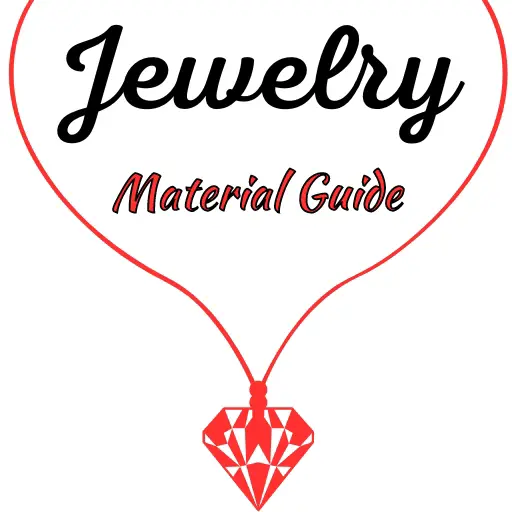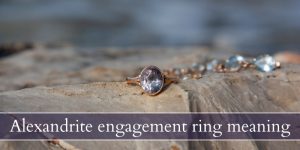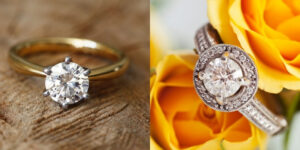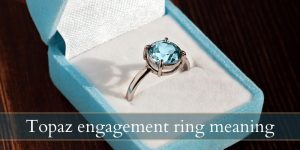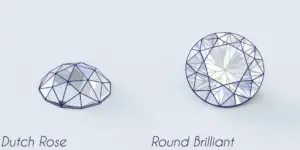Wedding bands are the symbol of your marriage, and there are often a lot of feelings around them, including whether they should match or not. This can lead to a lot of heated arguments since everyone has an opinion and these are very string, emotional-rooted opinions. Perhaps it would be a good idea to first weigh the pros and cons of getting matching wedding bands. Also you and your partner might be thinking of different meanings for the word ‘matching’ – maybe you think 100% the exact same band, while your partner just wants them to be similar, not the exact same.
So let’s take a look at whether wedding bands have to match, the pros and cons of matching them, and whether you have to wear one in the first place.
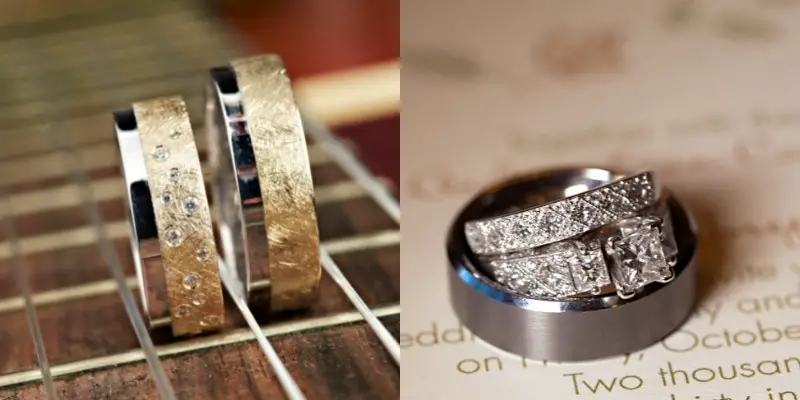
Do wedding bands have to match ?
Traditionally wedding bands are supposed to match, to show the couple’s commitment. However more and more wedding bands feature slightly different bands for men and women, usually with a more lavish band for the woman. Completely different wedding bands are also on the rise, as sometimes people have wildly different tastes and want to wear something that reflects their personal style.
Our own wedding bands are part of the same set, but my husband’s band is a plain mirror-finish band with a slightly raised second band down the middle, while mine has a diamond illusion cut pattern going all around the wedding band. When you put them next to each other they’re similar but not exactly matching.
We have a pair of friends with wedding bands that are the exact same pattern, except the woman’s band has three small diamonds on a diagonal. Yet another pair of friends has 100% matching plain gold bands, same width, just different ring sizes.
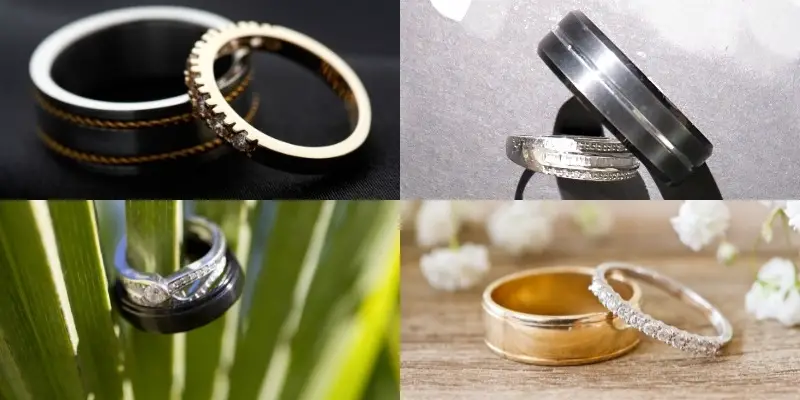
The wedding band is, in the end, just a symbol of your marriage. It is not the defining feature of a marriage, but it is an important aspect. Choosing your wedding bands is also quite difficult if you intend to wear similar bands, but the end result is always a beautiful option.
Let’s take a look at the pros and cons of wearing matching bands. Please keep in mind that by matching bands we mean both 100% matching bands, and the similar ones, where they’re not the exact same band but are the same style.
Pros of matching wedding bands
Matching wedding bands make for a very cute and romantic statement. It shows that your are committed to working things out as a couple and want to do everything together. It’s a bit like coordinating outfits at an event, but permanent.
Another pro of getting matching wedding bands is that it will be immediately clear to anyone looking who is married to whom. Two bands that are exactly the same or very similar will make it very easy to pick out a couple from a crowd.
If your matching wedding bands are simple, plain bands they are very easy to maintain, re-polish, and clean. And if you ever want to add a pattern onto them, this is easily done.
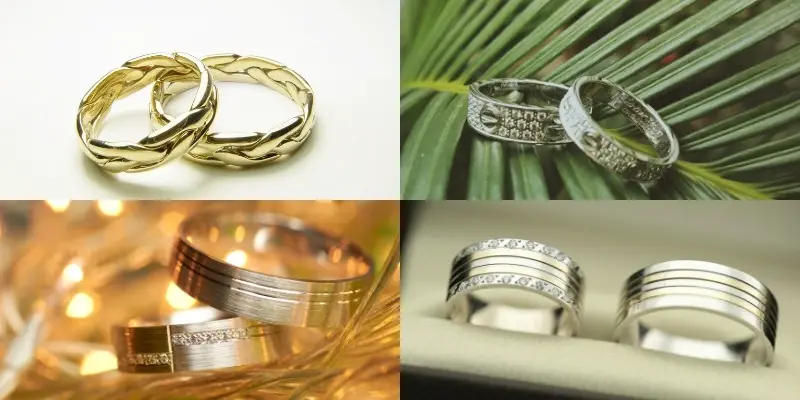
Cons of matching wedding bands
Finding an exact style that ticks most boxes and suits you both is not easy and will test your relationship. Not everyone has the same tastes so there will be a bit of give and take, unless one of you is willing to compromise.
Some may also find that matching wedding bands are a bit cheesy and overly romantic.
In some cases a very different-looking wedding band is necessary, to accommodate a unique engagement ring shape or design.
Read also: Solitaire VS Halo Rings
Do you have to wear a wedding band ?
There is no legal obligation to wear a wedding band so no, you don’t have to wear a wedding band. Most people wear them as a symbol of commitment, but you are not obligated to wear them. It also doesn’t necessarily mean that you do not love your spouse if you don’t wear a wedding band. Some jobs call for no jewelry at all, and in these cases a wedding band can be a safety hazard.
That being said, it’s important to discuss this with your partner. If you do not want to wear a wedding band and your partner does, it may lead to resentment down the line, and possibly even thoughts of cheating. It is very important to discuss this with your partner and be very clear about why you do not want to wear a wedding band, to avoid awkward discussions down the line.
You might find out your partner doesn’t want to wear the band either, or maybe they think this is very important and you will have to come to a mutual compromise, such as:
- wearing your wedding band after work, if it’s a safety hazard
- wearing a silicone band if comfort is an issue
- getting matching tattoos instead of wedding bands if misplacing the band is an issue
- getting a very thin or very wide band if aesthetics are the problem
In any case, talk it over before deciding not to wear it. It’s far easier to avoid hurt feelings and resentment now, than it will be later.
Who buys the wedding bands ?
The couple usually buys their own wedding bands together. This usually involved several trips to jewelers and retailers to get a feel of different wedding band styles and seeing which they would like to wear best.
This step is one of the first the couple does together, as a couple, for their own marriage. If the engagement ring is usually bought by the man for the woman, often as a surprise, the wedding bands are a joint decision.
In some cultures there may be instances where the parents (or godparents) of the bride or groom buy the bands. In the Western world that is nor usually the case.
Do wedding bands have to be gold ?
No, wedding bands do not have to be gold, they can be any other metal that is safe to wear like silver, tungsten, platinum, stainless steel, aluminium, palladium, etc. Tradition dictates that gold is the metal for wedding bands, but you do not have to follow tradition to a T. For example if you’re someone how dislikes the feel of jewelry on their skin but want to wear a wedding band, there are silicone wedding bands that are very soft and comfortable to wear.
No matter what kind of metal or material your wedding band is, it has to be something you are proud to wear. So make sure the pattern, style, size, width, gems and anything else are just the way you like them. This is a ring you will (hopefully) be wearing for the rest of your life, so it better be something you love.
Do wedding bands scratch ?
Yes, wedding bands scratch because all metals are a bit soft. If you’re working something that involves a lot of hand work, such as gardening, woodworking, soldering, heavy lifting, etc you might want to look into stainless steel, palladium, or tungsten because those will withstand the wear and tear better than most. They will still scratch but they are harder to break.
Even cushy office jobs, house chores, or picking up your phone will lead to tiny, thin scratches on your wedding band. In time they will accumulate and lead to a nice patina of daily wear. This is easiest to see for mirror-finish rings.
If you want to avoid the look of scratches wedding bands, you can opt for a patterned band like:
- sandblasted – looks gritty and even glittery in the right light
- matte – like a very strong patina look
- illusion cut (any cut will do) – usually machine cut, offers plenty of distracting details and is quite sparkly
- or an actual pattern, as long as it has a lot of small details like a bark pattern, milgrain, scrollwork, etc.
If your wedding bands have scratched you have the option of taking it to a jeweler to have it re-finished. Do not try to re-polish it at home, especially if it’s a plated band. For example our bands are 14k white gold with a rhodium plating, and if they ever need re-polishing they need the rhodium coating taken off, re-polished, an then applied back.

I’m the main author for jewelrymaterialguide.com. I started this site after we did tons of research before our wedding and noticed that there is information about rings, jewelry, and so on that is really hard to find on the internet.
